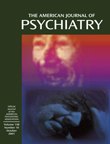Addition of Olanzapine for Treatment-Resistant Depression
Ms. A was a 40-year-old woman with a 10-year history of unipolar nonpsychotic major depression. She had been treated with several antidepressants, including tricyclics such as amitriptyline and clomipramine, which were prescribed at doses higher than 200 mg/day for at least 8 weeks, and selective serotonin reuptake inhibitors (paroxetine, 40 mg/day, fluoxetine, 40 mg/day) for more than 12 weeks. We had also tried augmentation with lithium, 750 mg/day, and carbamazepine, 600 mg/day, without success.During a particularly severe depressive episode (21-item Hamilton Depression Rating Scale score of 36), Ms. A was consecutively treated with iproclozide, a monoamine oxidase inhibitor, and ECT, but she experienced only a partial response. All of these trials appeared unsuccessful in achieving remission, and Ms. A remained chronically depressed for several years, with a score regularly higher than 15 on the 21-item Hamilton depression scale. Her last treatment with venlafaxine, 300 mg/day, was associated with a moderate improvement in her depressive symptom profile (Hamilton depression scale score of 16). Because of mild nausea and sedation, her venlafaxine dose was decreased to 225 mg/day over about 1 year.On the basis of the potential antidepressant effect of the newer antipsychotics, we decided to add olanzapine, 5 mg/day, to her treatment with venlafaxine, 225 mg/day. After 2–3 days Ms. A experienced an impressive improvement in her depressive symptoms, achieving a complete remission for the first time in 10 years (Hamilton depression scale score of 0). Olanzapine was well tolerated, with the exception of mild weight gain. Unfortunately, Ms. A considered the weight increase a major side effect and stopped taking olanzapine. After 4–5 days she experienced a new depressive symptom profile, consisting of a depressed mood, sadness, insomnia, a decrease in activities, and feelings of guilt and anxiety (Hamilton depression scale score of 14).After 1 month she agreed to take olanzapine again, which was associated with a further dramatic antidepressant response after 3 days of administration. Her Clinical Global Impression (CGI) score for severity of illness was 1, and the CGI global improvement score was 1. Ms. A’s family described this improvement as unexpected. Currently, her full remission has been maintained for 15 months.
References
Information & Authors
Information
Published In
History
Authors
Metrics & Citations
Metrics
Citations
Export Citations
If you have the appropriate software installed, you can download article citation data to the citation manager of your choice. Simply select your manager software from the list below and click Download.
For more information or tips please see 'Downloading to a citation manager' in the Help menu.
View Options
View options
PDF/EPUB
View PDF/EPUBLogin options
Already a subscriber? Access your subscription through your login credentials or your institution for full access to this article.
Personal login Institutional Login Open Athens loginNot a subscriber?
PsychiatryOnline subscription options offer access to the DSM-5-TR® library, books, journals, CME, and patient resources. This all-in-one virtual library provides psychiatrists and mental health professionals with key resources for diagnosis, treatment, research, and professional development.
Need more help? PsychiatryOnline Customer Service may be reached by emailing [email protected] or by calling 800-368-5777 (in the U.S.) or 703-907-7322 (outside the U.S.).

